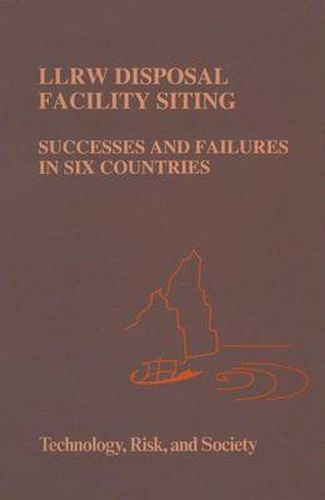Readings Newsletter
Become a Readings Member to make your shopping experience even easier.
Sign in or sign up for free!
You’re not far away from qualifying for FREE standard shipping within Australia
You’ve qualified for FREE standard shipping within Australia
The cart is loading…






Planning for the management of nuclear wastes, whatever their level of radioactivity, is one of the most important environmental problems for all societies that produce utility, industrial, medical, or other radioactive waste products. Attempts to site low-level radioactive waste disposal facilities in Western industrial societies, however, have repeatedly engendered conflicts between governments, encountered vehement opposition on the part of local citizen groups, and given rise to overt hostilities among involved parties. LLRW Disposal Facility Siting is the result of a study designed to learn more about the causes underlying failed and successful efforts to site LLRW disposal facilities. The study is based on case histories of LLRW disposal facility siting processes in six countries. Siting processes in five states within the United States and in five additional countries are analyzed using information obtained from public documents and supplemented by interviews with key participants. The selected states and countries are major generators of LLRW and each has made efforts to establish LLRW disposal facilities between 1984 and 1994. They vary widely in the approaches they have adopted to LLRW management, the institutional structures developed for managing the siting process, the means used to involve stakeholders and technical experts in the facility siting process and the amount and type of data used in making decisions. The analysis of these case histories provides general lessons about the advantages, disadvantages, strengths, and weaknesses of the various approaches that have been attempted or implemented. The text provides data for academics and researchers working in the area of environmental management.
$9.00 standard shipping within Australia
FREE standard shipping within Australia for orders over $100.00
Express & International shipping calculated at checkout
Planning for the management of nuclear wastes, whatever their level of radioactivity, is one of the most important environmental problems for all societies that produce utility, industrial, medical, or other radioactive waste products. Attempts to site low-level radioactive waste disposal facilities in Western industrial societies, however, have repeatedly engendered conflicts between governments, encountered vehement opposition on the part of local citizen groups, and given rise to overt hostilities among involved parties. LLRW Disposal Facility Siting is the result of a study designed to learn more about the causes underlying failed and successful efforts to site LLRW disposal facilities. The study is based on case histories of LLRW disposal facility siting processes in six countries. Siting processes in five states within the United States and in five additional countries are analyzed using information obtained from public documents and supplemented by interviews with key participants. The selected states and countries are major generators of LLRW and each has made efforts to establish LLRW disposal facilities between 1984 and 1994. They vary widely in the approaches they have adopted to LLRW management, the institutional structures developed for managing the siting process, the means used to involve stakeholders and technical experts in the facility siting process and the amount and type of data used in making decisions. The analysis of these case histories provides general lessons about the advantages, disadvantages, strengths, and weaknesses of the various approaches that have been attempted or implemented. The text provides data for academics and researchers working in the area of environmental management.